

Roy
Maurice Keane born 10 August 1971 is an Irish football
assistant manager and former professional football player.
He is the joint-most successful Irish footballer of all
time, having won 19 major trophies, 17 of which came at
Manchester United, in his club career. He is
currently the assistant manager of the Republic of Ireland
national football team.
In his 18-year-long playing
career, Keane played for Cobh Ramblers, Nottingham Forest, and
Manchester United, before ending his career at Celtic. Keane was a
dominating box-to-box midfielder, noted for his aggressive and
highly competitive style of play, an attitude that helped him
excel as captain of Manchester United from 1997 until his
departure in 2005. Joining the club in 1993, Keane helped United
achieve a sustained period of success during his twelve year
tenure at the club. He then signed for Celtic, but retired as a
player less than a year later.
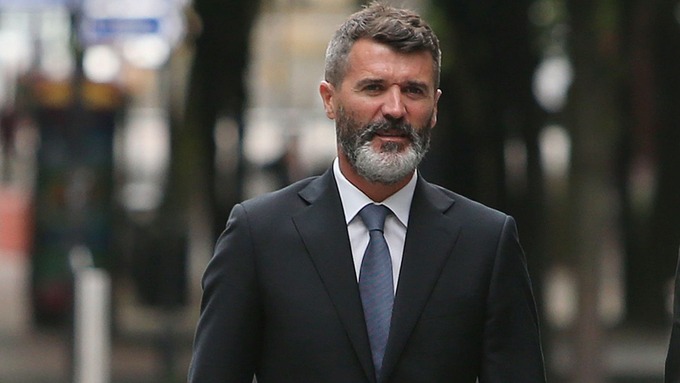
Keane played at
international level for much of his career, representing the
Republic of Ireland over a period of 14 years, most of which he
spent as captain. He played in every Republic of Ireland game at
the 1994 FIFA World Cup, although he was sent home from the 2002
World Cup after a dispute with national coach Mick McCarthy
regarding training facilities for the team. Regarded as one of the
best midfielders of his generation, in 2004 Keane was named by
Pelé in the FIFA 100 list of the world's greatest living
players.In 2007, The Times placed him at number 11 in their list
of the 50 "hardest" footballers in history.
Keane was appointed manager
of Sunderland shortly after his retirement as a player and took
the club from 23rd position in the Football League Championship,
in late August, to win the division title and gain promotion to
the Premier League. Keane's arrival was cited as the key catalyst
in Sunderland's recovery. He managed to keep Sunderland from
relegation in the 2007–08 season but in his second season as a
top-flight manager he left his position with Sunderland in the
relegation zone. In April 2009, he was appointed as manager of
Ipswich Town but was dismissed after 20 months in January 2011 due
to the club's position of 19th in the Championship.
Roy Keane - The Real Captain Fantastic
A powerful, dominant, and
highly competitive midfielder, in his prime, Keane was known for
his work-rate, mobility, energy, and hard-tackling style of play,
which earned him a reputation as one of the best players in the
world in his position, but also a degree of infamy, due to his
tendency to pick up cards and commit rash challenges. Usually
operating in either a holding or box-to-box role in the centre,
his most prominent traits were his stamina, tenacity, aggression,
and ball-winning abilities, although he was a complete midfielder,
who possessed a wide range of skills, and was also capable of
carrying the ball forward after obtaining possession and either
distributing it to other players or creating chances for his
teammates, courtesy of his precise passing, and could even score
goals himself. An influential presence on the pitch, he also stood
out
for his leadership and strong character throughout his career, as
well as his temper.
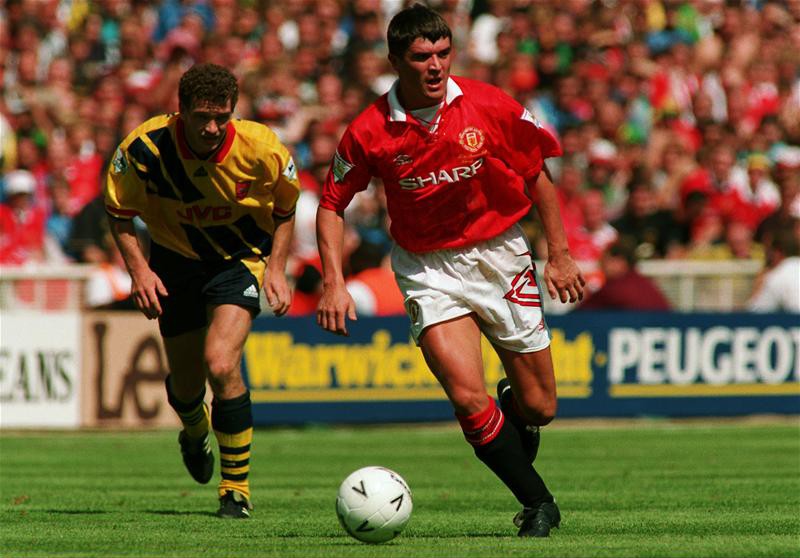
Keane was born into a working class family in Ballinderry Park, Mayfield, Cork. His father, Maurice, took work wherever he could find, which led to jobs at a local knitwear company and at Murphy's Irish Stout brewery, among others. His family were keen on sport, football especially, and many of his relatives had played for junior clubs in Cork, including Rockmount. Keane took up boxing at the age of nine and trained for a number of years, winning all of his four bouts in the novice league. During this period he was developing as a much more promising footballer at Rockmount, and his potential was highlighted when he was voted Player of the Year in his first season. Many of his teammates were offered trials abroad with English football teams, but Keane was not.
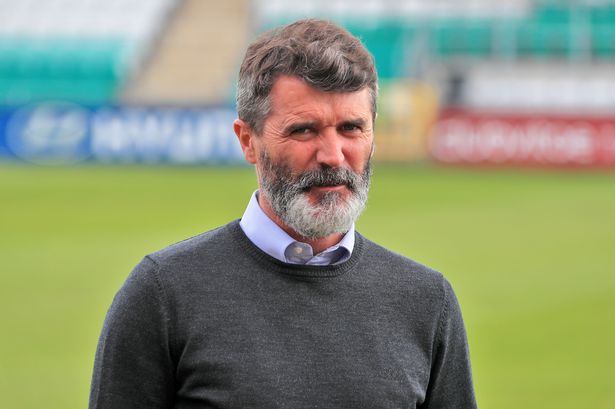
Keane supported Celtic and
Tottenham Hotspur as a child, citing Liam Brady and Glenn Hoddle
as his favourite players, but as time progressed, Manchester
United's Bryan Robson became the footballer he most admired.Keane
is married to Theresa Doyle, and they have five children: Shannon,
Caragh, Aidan, Leah and Alanna. The couple met when she was a
dentist's assistant and he was playing for Nottingham Forest in
1992. They married in Mayfield, Cork, in 1997.
When Keane moved to
Manchester United, the family lived in a modern four-bedroom house
in Bowdon, then moved to a mock Tudor mansion in Hale. It was not
as private as he had hoped, a point proven during his exclusion
from the 2002 World Cup. Often seen walking his dog Triggs, Keane
was then a regular at the Bleeding Wolf pub, and was found there
by reporters on the night of David Beckham's wedding. When asked
why he had not attended the wedding, Keane quipped that "it was a
choice between the wedding and the Wolf – and the Wolf won".
Wanting more privacy, his family had a 1930s-built home bulldozed
so they could build a new £2.5 million house near Hale.
On 6 June 2009, it was
announced that Keane and his family had purchased a new house in
the Ipswich area, near to the training ground of Keane's new club,
Ipswich Town. He eventually settled in the nearby market town of
Woodbridge, where he now lives with his family.In October 2014,
Keane released the second part of his autobiography The Second
Half, which was ghost written by Roddy Doyle. It is the follow up
to his first autobiography, released in 2002 which was ghost
written by Eamon Dunphy.
Roy Keane The Last Football Hard Man
Initially, Keane was turned
down from the Ireland schoolboys squad after a trial in Dublin;
one explanation from former Ireland coach and scout Ronan Scally
was that the 14-year-old Keane was "just too small" to make it at
the required level. Undeterred, he began applying for trials with
English clubs, but he was turned down by each one. As his
childhood years passed, he took up temporary jobs involving manual
work while waiting for a breakthrough in his football prospects.
In 1989, he eventually signed for the semi-professional Irish club
Cobh Ramblers after persuasion from Ramblers' youth team manager
Eddie O'Rourke.
Keane was one of two
Ramblers representatives in the inaugural FAI/FAS scheme in
Dublin, and it was through this initiative that he got his first
taste of full-time training. His rapid progression into a
promising footballer was reflected by the fact that he would
regularly turn out for Ramblers' youth side as well as the actual
first team, often playing twice in the same weekend as a result.
In an FAI Youth Cup match
against Belvedere, Keane's performance attracted the attention of
watching Nottingham Forest scout Noel McCabe, who asked him to
travel over to England for a trial. Keane impressed Forest manager
Brian Clough, and eventually a deal for Keane worth £47,000 was
struck with Cobh Ramblers in the summer of 1990.
Keane initially found life
in Nottingham difficult due to the long periods away from his
family, and he would often ask the club for a few days' home leave
in order to return to Cork. Keane expressed his gratitude at
Clough's generosity when considering his requests, as it helped
him get through his early days at the club. Keane's first games at
Forest came in the Under-21s team during a pre-season tournament
in the Netherlands. In the final against Haarlem, he scored the
winning penalty in a shootout to decide the competition, and he
was soon playing regularly for the reserve team. His professional
league debut came against Liverpool at the start of the 1990–91
season, and the resulting performance encouraged Clough to use him
more and more as the season progressed.
Keane eventually scored his
first professional goal against Sheffield United, and by 1991 he
was a regular starter in the side, displacing the England
international Steve Hodge. Keane scored three goals during a run
to the 1991 FA Cup final, which Forest ultimately lost to
Tottenham Hotspur. In the third round, however, he made a costly
error against Crystal Palace, gifting a goal to the opposition and
allowing them to draw the game. On returning to the dressing room
after the game, Clough punched Keane in the face in anger,
knocking him to the floor. Despite this incident, Keane bore no
hard feelings against his manager, later claiming that he
sympathised with Clough due to the pressures of management and
that he was too grateful to him for giving him his chance in
English football. A year later, Keane returned to Wembley with
Forest for the Football League Cup final, but again finished on
the losing side as Manchester United secured a 1–0 win.
Keane was beginning to
attract attention from the top clubs in the Premier League, and in
1992, Blackburn Rovers manager Kenny Dalglish spoke to Keane about
the possibility of a move to the Lancashire club at the end of the
season. With Forest struggling in the league and looking
increasingly likely to be relegated, Keane negotiated a new
contract with a relegation escape clause. The lengthy negotiations
had been much talked about in public, not least by Brian Clough,
who described Keane as a "greedy child" due to the high wages
demanded by the Irishman.
"Keane is the hottest
prospect in football right now, but he is not going to bankrupt
this club", Clough stated. Despite the extended contract
negotiations, Forest fans voted him the club's Player of the
Season. Despite his best efforts, Keane could not save Forest from
relegation, and the clause in his contract became activated.
Blackburn agreed a £4 million fee for Keane, who soon after agreed
a contract with the club.
A mistake, however,
prevented the move to the club: when the contract had been agreed,
Dalglish realised they did not have the correct paperwork needed
to complete the transfer. This was on a Friday afternoon, and the
office had been locked up for the weekend. With a verbal agreement
in place, they agreed to meet on Monday morning to complete the
transfer officially. Manchester United manager Alex Ferguson,
hearing about the move, phoned Keane and asked whether he would
like to join them instead of Blackburn. Ferguson ensured they had
the paperwork ready and met up with Keane on the Saturday and
signed for Manchester United for £3.75 million, a British transfer
record at the time.
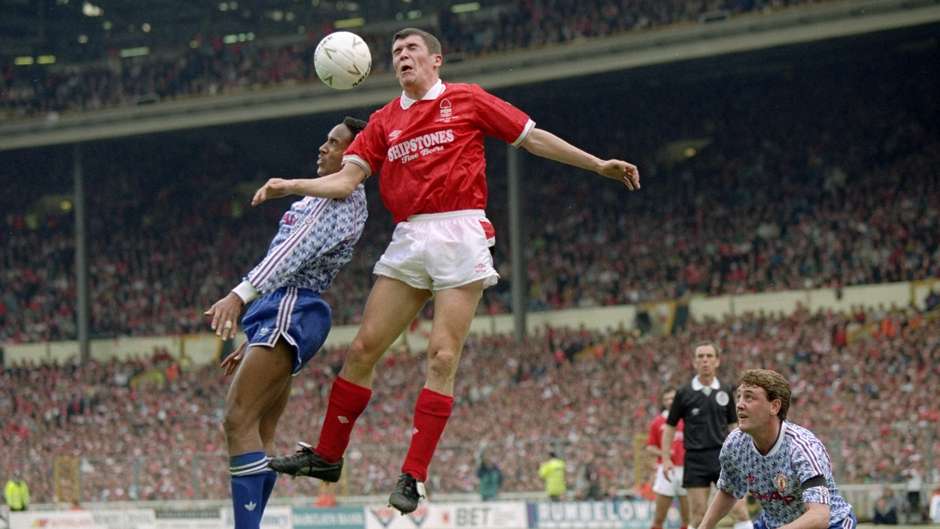
1993–97
Despite the then-record
transfer fee, there was no guarantee that Keane would go straight
into the first team. Paul Ince and Bryan Robson had established a
formidable partnership in the centre of midfield, having just
inspired Manchester United to their first league title since 1967.
Robson, however, was 36 years old and in the final stages of his
playing career, and a series of injuries kept him out of action
for most of the 1992–93 season and into the 1993–94 season. As a
result Keane had an extended run in the team, scoring twice on his
home debut in a 3–0 win against Sheffield United, and grabbing the
winner in the Manchester derby three months later when United
overturned a 2–0 deficit at Maine Road to beat Manchester City
3–2.

Keane had soon established
himself as a first choice selection, and by the end of the season
he had won his first trophy as a professional as United retained
their Premier League title. Two weeks later, Keane broke his
Wembley losing streak by helping United to a 4–0 victory over
Chelsea in the FA Cup Final, sealing the club's first ever
"double".
The following season was
less successful, as United were beaten to the league title by
Blackburn Rovers and beaten 1–0 in the FA Cup final by Everton.He
received his first red card as a Manchester United player in a 2–0
FA Cup semi-final replay win against Crystal Palace, after
stamping on Gareth Southgate, and was suspended for three matches
and fined £5,000. This incident was the first of 11 red cards
Keane would accumulate in his United career, and one of the first
signs of his indiscipline on the field.
The summer of 1995 saw a
period of change at United, with Ince leaving for Internazionale,
Mark Hughes moving to Chelsea and Andrei Kanchelskis being sold to
Everton. Younger players such as David Beckham, Nicky Butt and
Paul Scholes were brought into the team, which left Keane as the
most experienced player in midfield. Despite a slow start to the
1995–96 campaign, United pegged back title challengers Newcastle
United, who had built a commanding 12-point championship lead by
Christmas, to secure another Premier League title. Keane's second
double in three years was confirmed with a 1–0 win over Liverpool
to win the FA Cup for a record ninth time.
The next season saw Keane in and out of the side due to a series
of knee injuries and frequent suspensions. He picked up a costly
yellow card in the first leg of the Champions League semi-final
against Borussia Dortmund, which ruled him out of the return leg
at Old Trafford.United lost both legs 1–0, but this was
compensated for by winning another league title a few days later.
1997–2001
After Eric Cantona's
unexpected retirement, Keane took over as club captain, although
he missed most of the 1997–98 season because of a cruciate
ligament injury caused by an attempt to tackle Leeds United player
Alf-Inge Håland in the ninth Premier League game of the season. As
Keane lay prone on the ground, Håland stood over Keane, accusing
the injured United captain of having tried to hurt him and of
feigning injury to escape punishment, an allegation which would
lead to an infamous incident
between the two players four years later.
Keane did not return to
competitive football that campaign, and could only watch from the
sidelines as United squandered an 11-point lead over Arsenal to
miss out on the Premier League title. Many pundits cited Keane's
absence as a crucial factor in the team's surrender of the league
trophy. Keane returned as captain the side the following season,
and guided them to a treble of the FA Premier League, FA Cup, and
UEFA Champions League. In an inspirational display against
Juventus in the second leg of the Champions League semi-final, he
helped haul his team back from two goals down to win 3–2, scoring
the first United goal. His performance in this game has been
described as his finest hour as a footballer.
Keane, however, received a
yellow card after a trip on Zinedine Zidane that ruled him out of
the final. United defeated Bayern Munich 2–1 in the final, but
Keane had mixed emotions about the victory due to his suspension.
Recalling his thoughts before the game, Keane said, "Although I
was putting a brave face on it, this was just about the worst
experience I'd had in football. " Later that year, Keane scored
the only goal in the final of the Intercontinental Cup, as United
defeated Palmeiras in Tokyo.
The following season saw
prolonged contract negotiations between Keane and Manchester
United, with Keane turning down an initial £2 million-a-year offer
amid rumours of a move to Italy. His higher demands were
eventually met midway through the 1999–2000 season, committing him
to United until 2004. Keane was angered when club officials
explained an increase in season ticket prices was a result of his
improved contract and asked for an apology from the club. Days
after the contract was signed,
Keane celebrated by scoring the winning goal against Valencia in
the Champions League, although United's defence of the Champions
League was ended by Real Madrid in the quarter-finals, partly due
to an unfortunate Keane own goal in the second leg. He was voted
PFA Players' Player of the Year and FWA Footballer of the Year at
the end of the season after leading United to their sixth Premier
League title in eight years.
Keane caused controversy in
November 2000, when he criticised sections of United supporters
after the Champions League victory over Dynamo Kyiv at Old
Trafford. He complained about the lack of vocal support given by
some fans when Dynamo were dominating the game, stating, "Away
from home our fans are fantastic, I'd call them the hardcore fans.
But at home they have a few drinks and probably the prawn
sandwiches, and they don't realise what's going on out on the
pitch. I don't think some of the people who come to Old Trafford
can spell 'football', never mind understand it." Keane's
comments started a debate in England about the changing atmosphere
in football grounds, and the term "prawn sandwich brigade" is now
part of the English football vocabulary, referring to people who
attend football games or claim to be fans of football because it
is fashionable rather than due to any genuine interest in the
game.
Keane made headlines again
in the 2001 Manchester derby, when five minutes from the final
whistle, he was sent off for a blatant knee-high foul on Alf-Inge
Håland in what was seen by many as an act of revenge.He initially
received a three-match suspension and a £5,000 fine from The
Football Association (FA), but further punishment was to follow
after the release of Keane's autobiography in August 2002, in
which he stated that he intended "to hurt" Håland. Keane's account
of the incident was as follows:I'd waited long enough. I fucking
hit him hard. The ball was there (I think). Take that you cunt.
And don't ever stand over me sneering about fake injuries.
An admission that the tackle
was in fact a premeditated assault, it left the FA with no choice
but to charge Keane with bringing the game into disrepute. He was
banned for a further five matches and fined £150,000 in the
ensuing investigation. Despite widespread condemnation, he later
maintained in an interview that he had no regrets about the
incident: "My attitude was, fuck him. What goes around comes
around. He got his just rewards. He fucked me over and my attitude
is an eye for an eye", and said he would probably do the same
thing again.
Håland later implied that
the tackle effectively finished his playing career as he never
played a full game afterwards. However, Håland did complete the
match and played 68 minutes of the following game. He also played
a friendly for Norway in between both matches. It was, in fact, a
long-standing injury to his left knee that ended his career rather
than his right.
2001–2005
United finished the 2001–02
season trophyless for the first time in four years. Domestically,
they were eliminated from the FA Cup by Middlesbrough in the
fourth round and finished third in the Premier League, their
lowest final position in the league since 1991. Progress was made
in Europe, however, as United reached the semi-finals of the
Champions League, their furthest advance since their successful
campaign of 1999. They were eventually knocked out on away goals
after a 3–3 aggregate draw with Bayer
Leverkusen, despite Keane putting United 3–2 up.
After the defeat, Keane
blamed United's loss of form on some of his teammates' fixation
with wealth, claiming that they had "forgot about the game, lost
the hunger that got you the Rolex, the cars, the mansion". Earlier
in the season, Keane had publicly advocated the breakup of the
treble-winning team as he believed the team-mates who had played
in United's victorious 1999 Champions League final no longer had
the motivation to work as hard.
In August 2002, Keane was
fined £150,000 by Sir Alex Ferguson and suspended for three
matches for elbowing Sunderland's Jason McAteer, and this was
compounded by an added five-match suspension for the controversial
comments about Håland. Keane used the break to undergo an
operation on his hip, which had caused him to take painkillers for
a year beforehand. Despite early fears that the injury was
career-threatening, and suggestions of a future hip-replacement
from his surgeon, he was back in the United team by December.
During his period of rest
after the operation, Keane reflected on the cause of his frequent
injuries and suspensions. He decided that the cause of these
problems was his reckless challenges and angry outbursts which had
increasingly blighted his career. As a result, he became more
restrained on the field, and tended to avoid the disputes and
confrontations with other players. Some observers felt that the
"new" Keane had become less influential in midfield as a
consequence of the change in his style of play, possibly brought
about by decreased mobility after his hip operation. After his
return, however, Keane displayed the tenacity of old,leading the
team to another league title in May 2003.
Throughout the 2000s, Keane
maintained a fierce rivalry with Arsenal captain Patrick Vieira.
The most notable incident between the two took place at Highbury
in 2005 at the height of an extreme period of bad blood between
United and Arsenal. Vieira was seen confronting United defender
Gary Neville in the tunnel before the game over his fouling of
José Antonio Reyes in the previous encounter between the two
sides,prompting Keane to verbally confront the Arsenal captain.
The incident was broadcast
live on Sky Sports, with Keane clearly heard telling match referee
Graham Poll to, "Tell him Vieira to shut his fucking mouth!" After
the game, which United won 4–2, Keane controversially criticised
Vieira's decision to play internationally for France instead of
his country of birth, Senegal. Vieira, however, later suggested
that, having walked out on his national team in the FIFA World Cup
finals, Keane was not in a good position to comment on such
matters.Referee Poll later revealed that he should have sent off
both players before the match had begun, though was under pressure
not to do so.
Overall, Keane led United to
nine major honours, making him the most successful captain in the
club's history. Keane scored his 50th goal for Manchester United
on 5 February 2005 in a league game against Birmingham City. His
appearance in the 2005 FA Cup final, which United lost to Arsenal
in a penalty shoot-out, was his seventh such game, an all-time
record in English football at the time. Keane also jointly holds
the record for the most red cards received in English football,
being dismissed a total of 13 times in his career. He was inducted
into the English Football Hall of Fame in 2004 in recognition of
his impact on the English game, and became the only Irish player
to be selected into the FIFA 100, a list of the greatest living
footballers picked by Pelé.
Keane unexpectedly left
Manchester United by mutual consent on 18 November 2005, during a
protracted absence from the team due to an injury sustained in his
last competitive game for the club,due to a robust challenge from
Luis García against Liverpool. His departure marked the climax of
increasing tensions between Keane and the United management and
players since the club's pre-season training camp in Portugal,
when he argued with Ferguson over the quality of the set-up at the
resort. Ferguson was
angered further by Keane's admission during an MUTV phone-in that
he would be "prepared to play elsewhere" after the expiration of
his current contract with United at the end of the season.
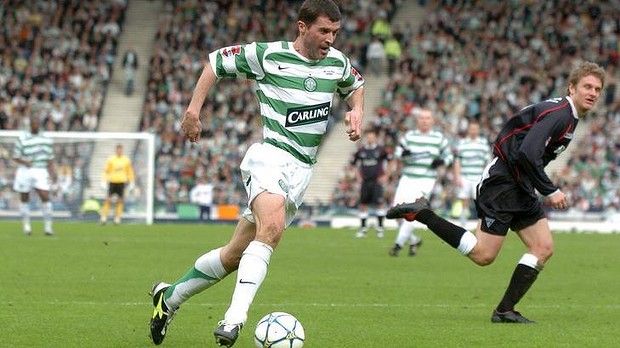
Another of Keane's appearances on MUTV provoked more controversy, when, after a humiliating 4–1 defeat at the hands of Middlesbrough in early November, he took the opportunity to criticise the performances of John O'Shea, Alan Smith, Kieran Richardson and Darren Fletcher. The harshest analysis, however, was reserved for the club's record signing Rio Ferdinand: "Just because you are paid £120,000-a-week and play well for 20 minutes against Tottenham, you think you are a superstar." The outburst was deemed too damning by the United management and was subsequently pulled from transmission by the club's TV station. Keane's opinions were described by those present at the interview as "explosive even by his standards".
Keane scored 33 league
goals for Manchester United, and a total of 51 in all
competitions.The first two of his goals for the club came in the
3–0 home win over Sheffield United in the Premier League on 18
August 1993, the last on 12 March 2005 in a 4–0 away win over
Southampton in the FA Cup.Two weeks later, after another row with
Ferguson, Keane reached an agreement with Manchester United
allowing him to leave the club immediately in order to sign a
long-term deal with another club. He was offered a testimonial in
recognition of his 12-and-a-half years at Old Trafford, with both
Ferguson and United chief executive David Gill wishing him wellfor
the future. On 15 December 2005, Keane was announced as a Celtic
player, the team he had supported as a child. Initial reports
suggested Keane was offered a contract of around £40,000 per week,
however this was rejected by the player himself in his second
autobiography, where he claimed he was actually only paid £15,000
per week while a Celtic player.
It was later revealed by
United that Keane's testimonial would take place at Old Trafford
on 9 May 2006 between United and Celtic. The home side won
the game 1–0, with Keane playing the first half for Celtic and the
second half in his former role as Manchester United captain. The
capacity crowd of 69,591 remains the largest crowd ever for a
testimonial match in England. All of the revenue generated from
the match was given to Keane's favourite charity, Irish Guide Dogs
for the Blind.
Keane's Celtic career began
in ignominious fashion in January 2006, when the Glasgow giants
crashed to a 2–1 defeat to Scottish First Division side Clyde in
the third round of the Scottish Cup. His abrasive style had not
dwindled, as he was seen criticising some of his new team-mates
during the match. Keane scored what turned out to be his only
Celtic goal a month later, a shot from 20 yards in a 2–1 Scottish
Premier League victory over Falkirk. He retained his place the
following Sunday in his first Old Firm derby against Rangers,
leading Celtic to victory. Celtic went on to complete a double of
the Scottish Premier League title and Scottish League Cup, his
last honour as a player.
Robbie Keane - All 16 Celtic Goals
On 12 June 2006, Keane
announced his retirement from professional football on medical
advice,only six months after joining Celtic. His announcement
prompted glowing praise from many of his former colleagues and
managers, not least from Sir Alex Ferguson, who opined, "Over the
years when they start picking the best teams of all time, he will
be in there."
Keane was part of the squad that participated in the 1988 UEFA European Under-16 Football Championship although he did not play. He was man of the match for the Republic of Ireland national under-19 team when they beat hosts Hungary in the 1990 UEFA European Under-18 Football Championship to qualify for the 1991 FIFA World Youth Championship.
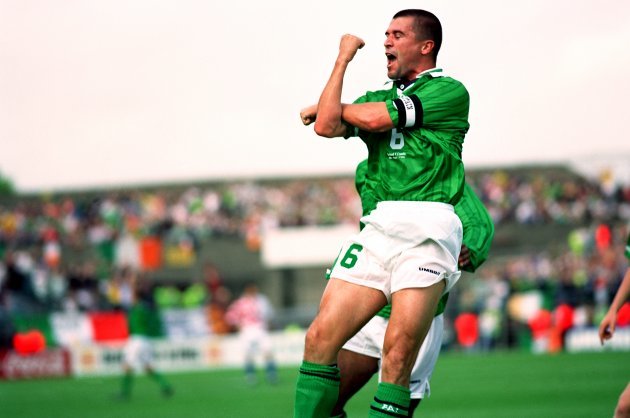
When called up for his first
game at international level, an under-21s match against Turkey in
1991, Keane took an immediate dislike to the organisation and
preparation surrounding the Irish team, later describing the
set-up as "a bit of a joke". He would continue to hold this view
throughout the remainder of his time spent with the national team,
which led to numerous confrontations with the Irish management.
Keane declared his unavailability to travel with the Irish squad
to Algeria, but was surprised when manager Jack Charlton told him
that he would never play for Ireland again if he refused to join
up with his compatriots.
Despite this threat, Keane
chose to stay at home on the insistence of Nottingham Forest
manager Brian Clough, and was pleased when a year later he was
called up to the Irish squad for a friendly at Lansdowne Road.
After more appearances, he grew to disapprove of Charlton's style
of football, which relied less on the players' skill and more on
continuous pressing and direct play. Tensions between the two men
peaked during a pre-season tournament in the United States, when
Charlton berated Keane for returning home late after a drinking
session with Steve Staunton.
Keane was included in the
Republic of Ireland senior squad for the 1994 FIFA World Cup in
the U.S. and played in every game, including a famous 1–0 victory
over tournament favourites and eventual runners-up Italy. Despite
a second-round exit at the hands of the Netherlands, the
tournament was considered a success for the Irish team, and Keane
was named the best player of Ireland's campaign. Keane, however,
was reluctant to join the post-tournament celebrations, later
claiming that, as far as he was concerned, Ireland's World Cup was
a disappointment: "There was nothing to celebrate. We achieved
little."
Roy Keane - Ireland's Greatest Player
Keane's former manager Sir
Alex Ferguson had previously said that he wanted Keane to succeed
him as Manchester United coach when he retired. In the wake of
Keane's acrimonious departure from the club, however, Ferguson
became evasive regarding Keane's prospects as a manager: "Young
managers come along and people say this one will be England
manager or boss of this club, but two years later they're not
there. It's not an easy environment to come into, I wouldn't
forecast anything."
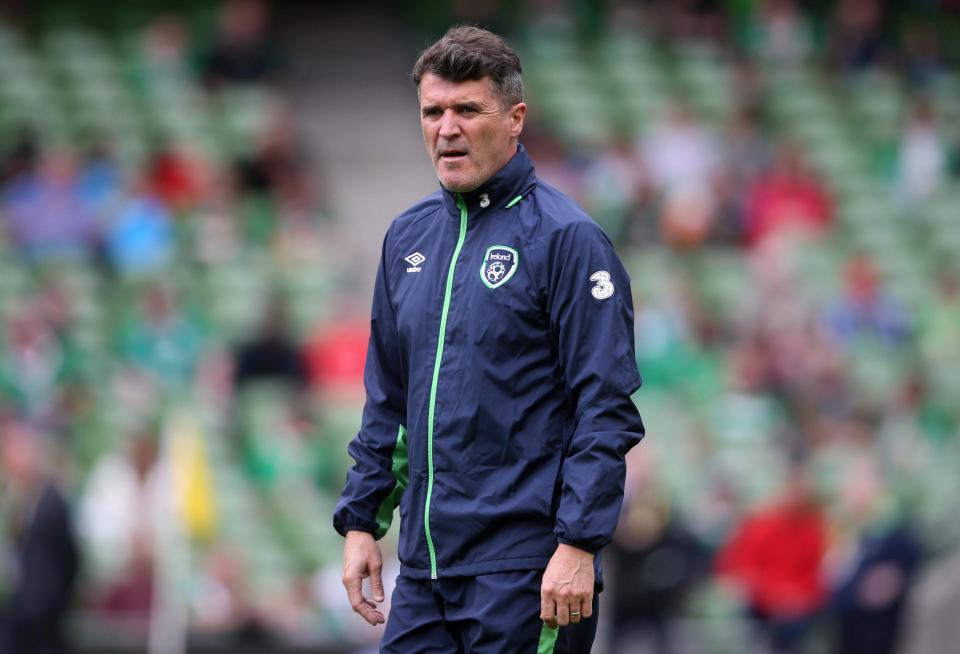
During his time at Celtic,
Keane was suggested as a potential managerial successor to Gordon
Strachan by former Celtic player Charlie Nicholas.However, it was
Championship club Sunderland where Keane chose to launch his
managerial career, re-uniting him with the club's chairman and
outgoing manager, Niall Quinn. The two men, publicly at least,
were on opposing sides during the fall-out from the Saipan
incident, but they were on good terms at the time of the
managerial appointment, with Quinn urging Sunderland fans to
"support and enjoy one of football's true greats".
Keane signed a three-year
deal immediately after Sunderland's victory over West Bromwich
Albion on 28 August, the Mackems' first win of the 2006–07 season
after a dreadful run of four consecutive defeats under Quinn's
temporary management. With his new club sitting in the relegation
zone already, second bottom of the Championship table, Keane chose
to enforce changes quickly. His first actions as manager were
deciding to keep the existing assistant manager, Bobby Saxton, and
to appoint his former Nottingham Forest colleague Tony Loughlan as
head coach.
He wasted no time in
bringing in new additions to the squad, with a total of six
players signing on the final day of the August transfer window.
The most notable signings were Keane's former Manchester United
teammates Dwight Yorke and Liam Miller, supported by former Celtic
colleagues Ross Wallace and Stanislav Varga, as well as
Wigan Athletic pair Graham Kavanagh and David Connolly. Keane's
first two games as manager could not have gone much better; first
coming from behind to beat Derby County 2–1, followed by an easy
3–0 victory over Leeds United. Sunderland began to steadily creep
up the league standings under Keane's management, and by the turn
of the year they had escaped the bottom half of the league.
Five further players were
signed during the January 2007 transfer window, three (Anthony
Stokes, Carlos Edwards and Stern John) on permanent contracts and
two (Jonny Evans and Danny Simpson) on loan from Manchester
United, Keane's old club. Results continued to improve, and Keane
was rewarded with the February and March Manager of the Month
awards, while his team began to challenge for the automatic
promotion places. Meanwhile, Keane tackled his players'
non-professional approach with a firm hand. When three players
were late for the team coach to a trip to Barnsley, in March 2007,
he simply left them behind.
Sunderland secured promotion
to the Premier League – along with Birmingham City – on 29 April
when rivals Derby were beaten by Crystal Palace. A week later, the
Championship title was sealed, and Sunderland's revival under
Keane was complete. His achievements also earned him the
Championship Manager of the Year award.The lowest point of their
next season came at Goodison Park, where they were beaten 7–1 by
Everton, which Keane described as "one of the lowest points" of
his career. In the second half of the season, however, the team's
form was much improved (especially at home) and survival in the
division was guaranteed with two games to go with a home win
against Middlesbrough.
Meanwhile, Keane carried on
his trend of buying ex-Manchester United players with the addition
of Kieran Richardson, Paul McShane, Danny Higginbotham and Phil
Bardsley. He has also continued his strict disciplinary policy by
putting Liam Miller (one of Sunderland's apparently more
consistent players) on the transfer list for being regularly late
for training and other team meetings.
The beginning of the 2008–09
season would prove to be tumultuous. In September 2008 Keane
became embroiled in a row with FIFA Vice-President Jack Warner
over the withdrawal of Dwight Yorke from the Trinidad and Tobago
national team. Warner accused Keane of being disrespectful towards
small countries. Keane responded by calling Warner "a clown" and
insisted that Yorke was retired from international football.That
same month Keane experienced "one of the worst and longest nights"
of his career when Sunderland had to come from 2–0 down at home in
a League Cup tie against Northampton Town. The game ended 2–2,
with Sunderland progressing narrowly on penalties.
Despite some positive
performances, including the historic 2–1 home victory against
local rivals Newcastle United on 25 October (the first time the
club had accomplished this in 28 years), as well as good showings
by recent signings like Djibril Cissé and Anton Ferdinand, the
team's general form remained inconsistent. By the end of November,
Sunderland were 18th in the Premier League, having lost five of
their six previous games. Keane stood down as manager on 4
December after bringing doubt on his own future with comments made
in the wake of the 4–1 home defeat by Bolton Wanderers the
previous weekend.
Keane's harsh management
style was not appreciated by the Sunderland players, who were
reported to have celebrated when they heard he had resigned.In an
interview with The Irish Times on 21 February 2009, Keane cited
differences with Sunderland 30% shareholder Ellis Short and
strains with club chairman Niall Quinn as the factors in his
decision to resign as Sunderland manager.
On 23 April 2009, Keane was
appointed as the new manager of Ipswich Town on a two-year
contract, the day after the club had dismissed Jim Magilton.
His first game in charge came the following Saturday with a 3–0
away win over Cardiff City, the final league match to be played at
Ninian Park. The following week, Ipswich rounded off the season
with a 2–1 win over Coventry City. In the 2009–10 season, Keane
started to sign some players, some of them from his former club
Sunderland. He signed goalkeeper Marton Fulop, midfielders Carlos
Edwards and Grant Leadbitter and brought in Jack Colback, David
Healy and Daryl Murphy on loan to the club.
Ipswich started without a
win in their first fourteen matches, making them the last team to
record their first win in the whole league, finally winning on 31
October against Derby County and recording their first away win of
the season on 29 November against Cardiff City. Their form
gradually improved throughout the season, but Ipswich drew far too
many games to come anywhere near the promotion race and they
finished the season in 15th place. Many inconsistencies in the
2009–10 and the 2010–11 season meant that Keane's Ipswich side
never really challenged for promotions and as a result of a poor
run of form, ending up with his side dropping to as low as 21st in
the Championship. Keane was dismissed as Ipswich manager on 7
January 2011.
On 5 November 2013, the FAI
announced that Martin O'Neill had been made the Republic of
Ireland manager, and that Keane had been made the assistant
manager. Their first match was against Latvia at the Aviva Stadium
in a 3–0 victory on 15 November 2013. After Neil Lennon left
Celtic at the end of the 2013–14 season, Keane looked set to
become the new manager of the Hoops. Martin O'Neill admitted he
won't stand in his way of taking over the reins at Celtic Park.
Keane, however, remained as assistant manager of Ireland and asked
not to be considered for the job. Keane later stated that he was
on the verge on taking the Celtic job and had met with Celtic
owner Dermot Desmond but felt "they didn't make him feel wanted
enough" and rejected the offer.
Keane later became the new
assistant manager of Aston Villa, combining his role with Villa
and Ireland.In October 2014, Keane caused controversy after his
book was released before crucial Euro 2016 qualifiers against
Gibraltar and Germany. Martin O'Neill, however, rejected the
claims that it was a distraction.A month later, before Ireland's
crucial qualifier against Scotland, Keane was involved in an
incident with a fan in the team hotel. An ambulance for the fan
was called as well as the Garda Síochána, but no
arrests or complaints were made.
The FAI and Martin O'Neill
came out in support of Keane after the incident. It later emerged
that CCTV footage exonerated Keane of any wrong doing. The man
involved in the incident is Brendan Grace's son-in-law Frank
Gillespie, who is believed to have asked Keane to sign a copy of
Keane's autobiography The Second Half. Keane refused to do so, and
Gillespie confronted Keane but then collapsed and an ambulance was
called to the hotel. Grace stated that Gillespie and Keane were
"old buddies".
After the Scotland game,
Keane claimed that Everton were putting pressure on the Irish
players like Séamus Coleman and James McCarthy (who missed the
Scotland through injury) to pull out of international squads.
Everton chairman Bill Kenwright refuted this claim, saying Keane
says "stupid things". Then-Everton manager Roberto Martínez also
dismissed Keane's comments.Again Keane was in the headlines after
a heated press conference with journalists before the United
States match. Keane got in a row with a journalist after he was
questioned if he was becoming a distraction from the Republic of
Ireland cause. Eamon Dunphy has called on the FAI and Martin
O'Neill to stop Keane from giving interviews to end the circus of
media attention around him.
On 1 July 2014, Keane was
confirmed as Aston Villa's new assistant manager, working
alongside manager Paul Lambert. He combined this role with his
assistant manager's role with the Republic of Ireland. On 28
November 2014, however, Keane quit his role as assistant manager
at Aston Villa to concentrate on his assistant manager role with
Ireland.
Roy Keane interviewed as Aston Villa assistant
manager
Remark: Read more about Soccer Profiles, fixes, transfers, soccer match predicttion and livescores from Sprot website